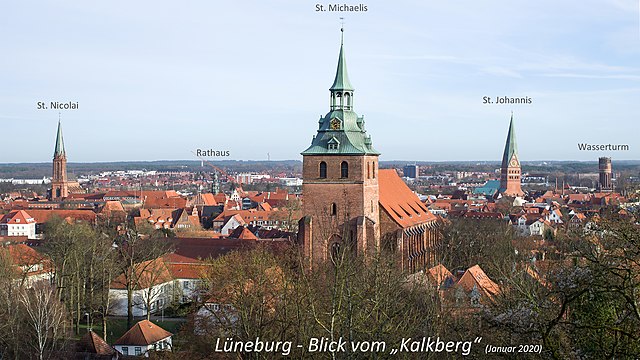Lüneburg, officially the Hanseatic City of Lüneburg and also known in English as Lunenburg, is a town in the German state of Lower Saxony. It is located about 50 km (31 mi) southeast of another Hanseatic city, Hamburg, and belongs to that city's wider metropolitan region. The capital of the district which bears its name, it is home to roughly 77,000 people. Lüneburg's urban area, which includes the surrounding communities of Adendorf, Bardowick, Barendorf and Reppenstedt, has a population of around 103,000. Lüneburg has been allowed to use the title "Hansestadt" in its name since 2007, in recognition of its membership in the former Hanseatic League. Lüneburg is also home to Leuphana University.
Panorama of Lüneburg from the water tower, with St. Johannis Church in the foreground to the right
View from the Kalkberg towards the east, with all three main churches
View from the Brausebrücke bridge
Miniature of Lüneburg in the Sächsische Weltchronik, 13th century
The Hanseatic League was a medieval commercial and defensive network of merchant guilds and market towns in Central and Northern Europe. Growing from a few North German towns in the late 12th century, the League expanded between the 13th and 15th centuries and ultimately encompassed nearly 200 settlements across eight modern-day countries, ranging from Estonia in the north and east, to the Netherlands in the west, and extended inland as far as Cologne, the Prussian regions and Kraków, Poland.
Northern Europe in the 1400s, showing the extent of the Hanseatic League
Ubena von Bremen, a replica of the Bremen cog
Hanseatic Seal of Elbing (now Elbląg)
The Holstentor of Lübeck, built in 1464, is the only historic gate of the city still standing today.








